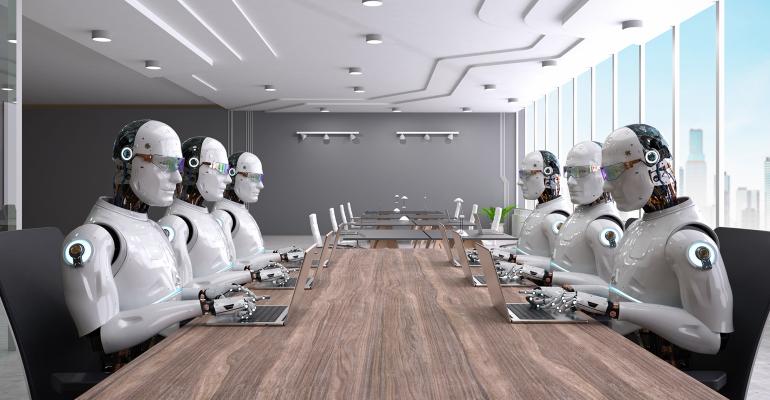(Bloomberg Opinion) -- It’s said that as work becomes increasingly automated thanks to artificial intelligence, our special human traits — empathy and humor, creativity and kindness — will become only more valuable.
I wonder. What we’ve seen so far doesn’t leave me optimistic.
Instead of embracing what makes us different from machines, we humans often seem to be trying to imitate them. Too many of us skip lunch, eschew breaks and work more feverishly, as if we’re just brains attached to rather inefficient, fleshy hardware — the bodies that (irritatingly) get sick, break down and require regular feeding and rest. Or we try to do too many things at once — texting while driving, emailing during meetings — as if we’re a laptop that can run multiple programs instead of a human that can focus on only one thing at a time.
Downtime is a flaw in a machine, but a requirement for a human. Nonetheless, there is pressure to work faster, as if speed and quality rise in lockstep. The arrival of chatbots like GPT-4 capable of churning out credible text in seconds further ups the ante on humans.
It’s as if John Henry wasn’t just trying to outdo a steam-powered drill, but become one. The result is that people and their workplaces have become less patient, less civil. Less human.
But ultimately, trying to imitate machines is a losing battle. “The race for IQ is being lost,” says Tomas Chamorro-Premuzic, chief innovation officer at ManpowerGroup and a business psychology professor. “By that I mean all of the things that are stochastic, algorithmic, objectively solvable. We are not going to be able to compete with machines.” What we must do is rehumanize a dehumanized workplace, he argues in his new book I, Human.
Chamorro-Premuzic warns that we must resist the pull of trying to out-machine the machines. We’ll never be faster than they are; we’ll never be more consistent, more rational. We’ll never be capable of putting in longer hours. Yet as technologies have allowed us to work more efficiently, efficiency has become prized as an end in itself, even though it often comes at the expense of other values, like creativity or thoughtfulness or generosity.
Interacting so often with computers may be fueling some amnesia in how to treat other humans. Christine Porath, associate professor of management at Georgetown University's McDonough School of Business, has studied incivility at work for more than two decades, and has found that more of us are being rude to each other. The rise predates the Covid-19 pandemic. And I’m not talking about just a failure to say “please” or “thank you.” Porath’s research has documented drivers and waitresses being berated to the point of tears, doctors shouting at nurses, bank tellers sniping at each other. One customer even told a service rep he hoped his wife and daughters would be raped. What’s wrong with people?

Writing about her research in the Harvard Business Review, Porath explains that stress, negative emotions, weak social ties and a lack of self-awareness can all play a role — but so does technology, which can exacerbate those other problems. When was the last time you signed off Twitter feeling lighter and happier? When your boss interrupts your one-on-one to check his phone, does it build your trust? Perhaps customers have become so accustomed to dealing with self-checkout kiosks, some have forgotten how to interact with real people.
I don’t think technology is the enemy (and even if it is, it isn’t going anywhere). Social media can be damaging to our mental health, but FaceTime allows my toddler to talk easily with her out-of-state grandparents. Part of the solution may be designing technology systems that are more flexible — more “tell me how I can help” and less “press 1.” Bing Chat’s creators at Microsoft have released an update that will let users choose the attitude they want the bot to show: creative, balanced or precise. That should make it easier for users to work with Bing. But I wonder: Will we start expecting our human colleagues to be similarly pliant?
A robot isn’t a person — even if its apologies sound genuinely sad, or it softens its replies with emojis. We can’t — and shouldn’t — be as perennially polite as Siri, as eager-to-please as Alexa, or as self-effacing as ChatGPT.
“People have called it ‘mansplaining as a service,’” notes Chamorro-Premuzic, “But actually, it’s more like a woman with imposter syndrome — it’s way too humble to be mansplaining, it’s always apologizing or saying ‘I might be biased.’”
So perhaps the bigger lesson is that although robots have huge cost efficiencies over humans, they also have a downside that’s tougher to quantify but no less real. Studies of even “empathetic” bots have shown that they don’t have the positive impact on customers that real human beings have, especially if the customer is already upset. Maybe it’s worth hiring humans to deal with other humans.
Inescapably, more of us will be working alongside machines, and we’ll have to get better at managing emotions. Not to spare their feelings — after all, they have none — but to keep our own dignity.
More From Bloomberg Opinion:
- AI Is About to Transform Childhood: Tyler Cowan
- GPT-4 Could Turn Work Into a Hyperproductive Hellscape: Parmy Olson
- Digital Detox Is a Fantasy. Do This Instead: Sarah Green Carmichael
Want more Bloomberg Opinion? OPIN
To contact the author of this story:
Sarah Green Carmichael at [email protected]
© 2023 Bloomberg L.P.





